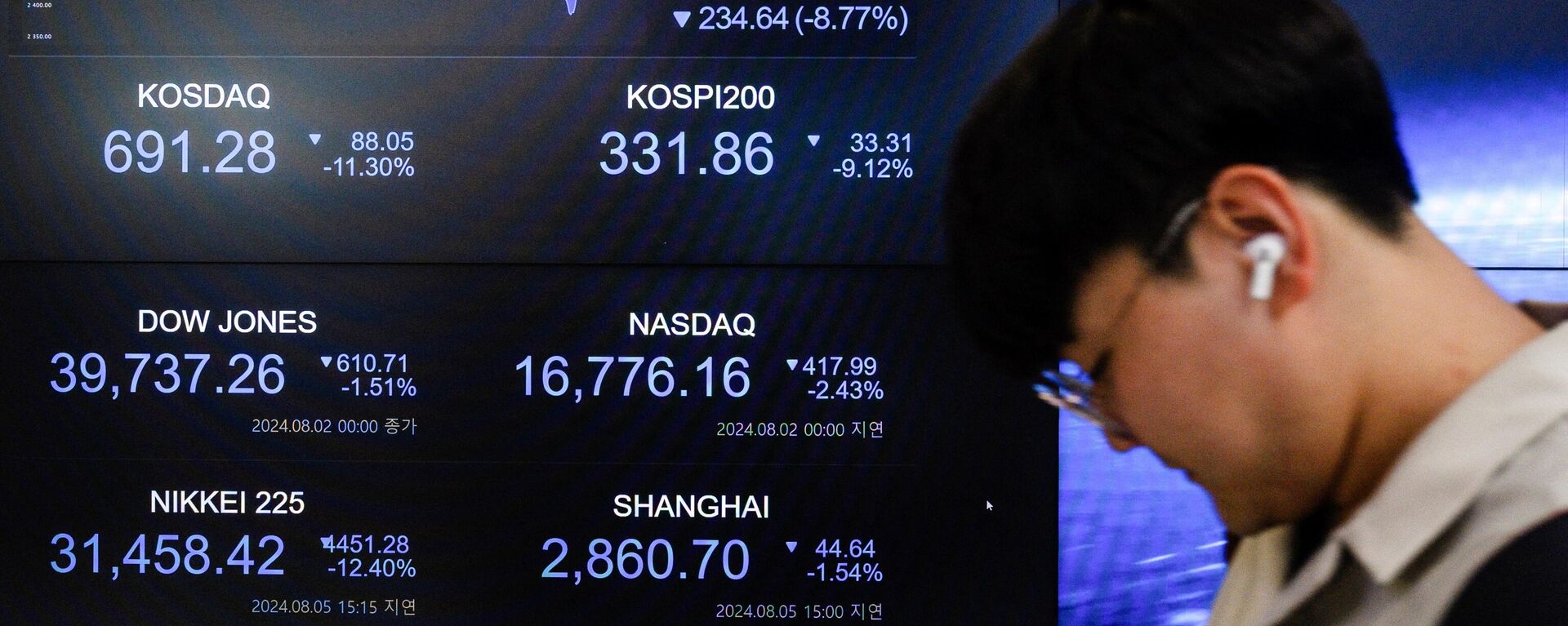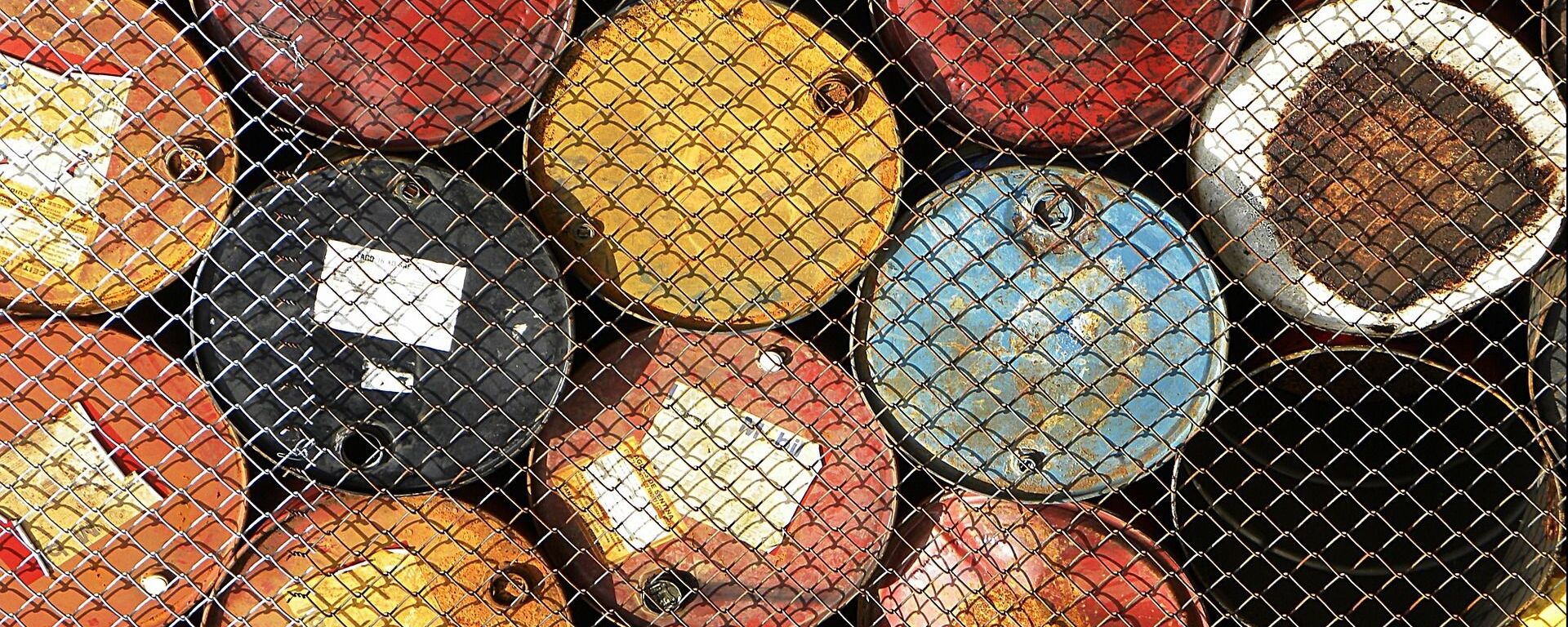https://sputnikglobe.com/20240805/the-day-markets-screamed-us-stocks-plummet-1000-plus-points-in-worst-trading-in-2-years-1119651334.html
The Day Markets Screamed: US Stocks Plummet 1,000-Plus Points in Worst Trading in 2 Years
The Day Markets Screamed: US Stocks Plummet 1,000-Plus Points in Worst Trading in 2 Years
Sputnik International
US stocks had their worst trading days in almost two years, with top-priced stock indexes S&P500 and Nasdaq both losing about 3% each, amid fears of a potential recession for the world’s largest economy.
2024-08-05T21:18+0000
2024-08-05T21:18+0000
2024-08-05T21:32+0000
economy
us
stock market
business
dow jones
nasdaq composite
economic recession
us jobs report
yen
nikkei index
https://cdn1.img.sputnikglobe.com/img/07e6/05/04/1095272424_0:321:3071:2048_1920x0_80_0_0_567714ac57b74db48660415d8f7574c6.jpg
The S&P 500 Index, which tracks stocks of the top 500 US companies, closed the day down 2.99%, extending the prior week’s 2% tumble. The technology-heavy Nasdaq Composite Index, which comprises stocks such as Amazon, Apple, Netflix, and Google, settled down 3.4%, giving up in a day what it lost all of last week.However, despite the severe market downturn, CEO of Sovereign Wealth Management Gary Korolev told Sputnik that a «recession is not as likely as it seems at this point, given that a lot of the economic data is actually improving.»»There is usually a dip in the ISM mid cycle and we are experiencing that dip right now. Usually a continuation of a recovery follows,» he noted.Stocks on Wall Street began falling like ten pins in a bowling alley after a softer-than-expected jobs report for August that escalated fears of a recession.US non-farm payrolls grew by 114,000 jobs in July, the smallest growth since the jobs boom that began after the pandemic, the Labor Department reported on Friday. Unemployment, meanwhile, rose to 4.3%, the highest since December 2021.Korolev further underscored that the current stock market free fall isn’t a Black Swan event, but that volatility will likely persist through August.Korolev explained that relatively weak economic data, a strong dollar, and yen strength prompted the present situation in the global stock market.Worries of a US recession have grown since July, when the Labor Department reported that non-farm payrolls grew by just 114,000, the smallest since the jobs boom that began after the pandemic. Unemployment, meanwhile, rose to 4.3%, the highest since December 2021.
https://sputnikglobe.com/20240805/why-did-the-global-stock-market-crash-and-who-is-to-blame—1119643785.html
https://sputnikglobe.com/20240805/oil-price-hits-lowest-levels-for-2024-as-us-economic-worries-spike-1119650802.html
2024
News
en_EN
https://cdn1.img.sputnikglobe.com/img/07e6/05/04/1095272424_340:0:3071:2048_1920x0_80_0_0_3de1d11c485108982c810cb0ccea005a.jpg
what caused us stocks to dive, global market crash, us fears of recession
what caused us stocks to dive, global market crash, us fears of recession
NEW YORK (Sputnik) – US stocks had their worst trading days in almost two years, with top-priced stock indexes S&P500 and Nasdaq both losing about 3% each, amid fears of a potential recession for the world’s largest economy.
The S&P 500 Index, which tracks stocks of the top 500 US companies, closed the day down 2.99%, extending the prior week’s 2% tumble.
The technology-heavy Nasdaq Composite Index, which comprises stocks such as Amazon, Apple, Netflix, and Google, settled down 3.4%, giving up in a day what it lost all of last week.
However, despite the severe market downturn, CEO of Sovereign Wealth Management Gary Korolev told Sputnik that a «recession is not as likely as it seems at this point, given that a lot of the economic data is actually improving.»
«There is usually a dip in the ISM mid cycle and we are experiencing that dip right now. Usually a continuation of a recovery follows,» he noted.
«If a recession was in the offing we would see a more general reduction in across the entire curve as investors rush into safe assets, meaning investment grade bonds,» Korolev said. «We would also see a bullish yield curve steepening in such a case … as investors rush into shorter term safe instruments.»
Stocks on Wall Street began falling like ten pins in a bowling alley after a softer-than-expected jobs report for August that escalated fears of a recession.
US non-farm payrolls grew by 114,000 jobs in July, the smallest growth since the jobs boom that began after the pandemic, the Labor Department reported on Friday. Unemployment, meanwhile, rose to 4.3%, the highest since December 2021.
Korolev further underscored that the current stock market free fall isn’t a Black Swan event, but that volatility will likely persist through August.
«This is somewhat of a routine pullback in the markets based on weaker economic data. This usually happens in the middle of an economic recovery. Would not call this a Black Swan,» Korolev said.
Korolev explained that relatively weak economic data, a strong dollar, and yen strength prompted the present situation in the global stock market.
«Yen is a funding currency so when it becomes less accessible, risk markets unwind,» he noted. «The US selloff followed the largest-ever point drop on Japan’s Nikkei index, which was caused by weak economic numbers coming out of the US.»
Worries of a US recession have grown since July, when the Labor Department reported that non-farm payrolls grew by just 114,000, the smallest since the jobs boom that began after the pandemic. Unemployment, meanwhile, rose to 4.3%, the highest since December 2021.



